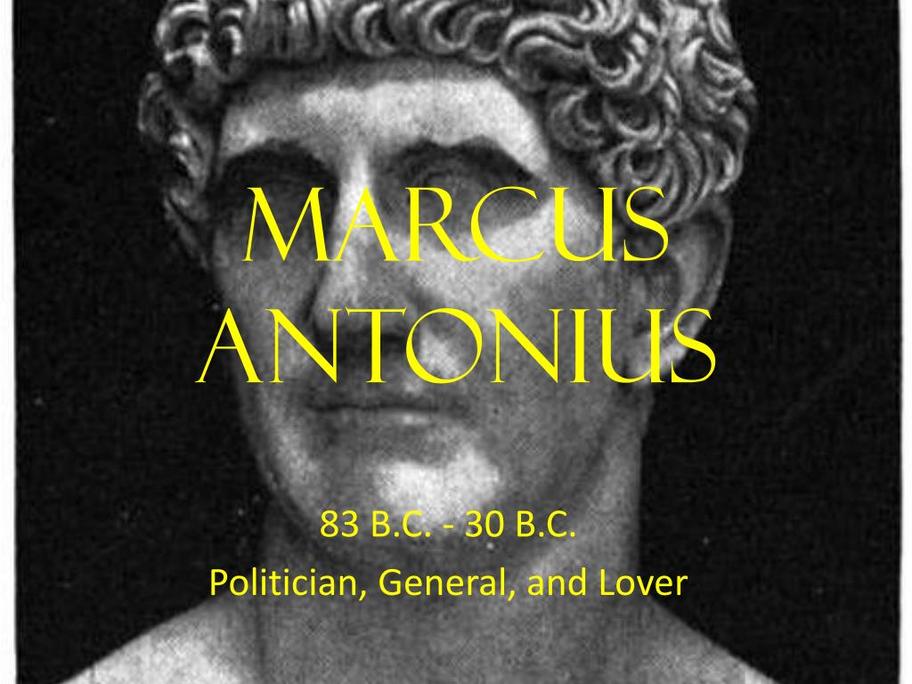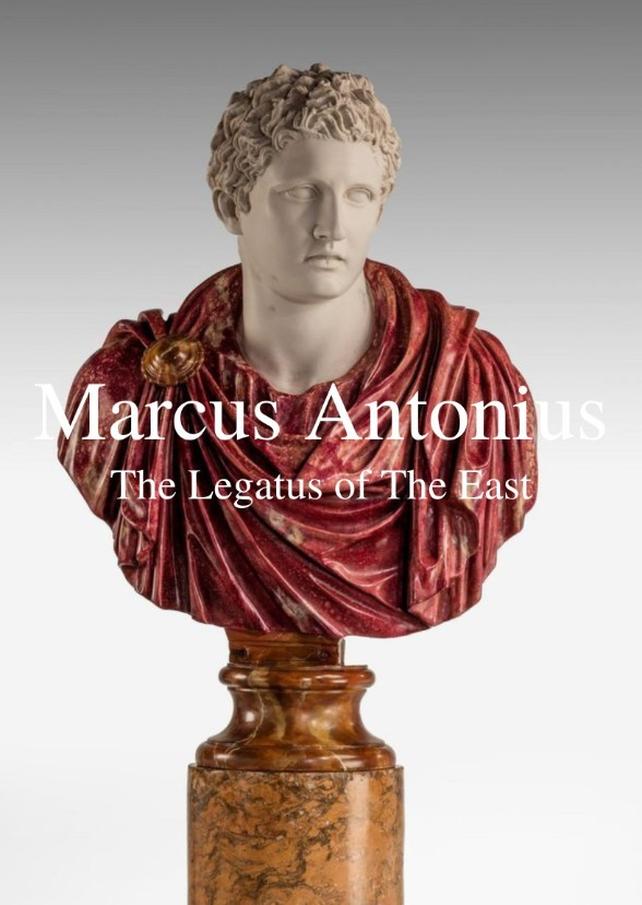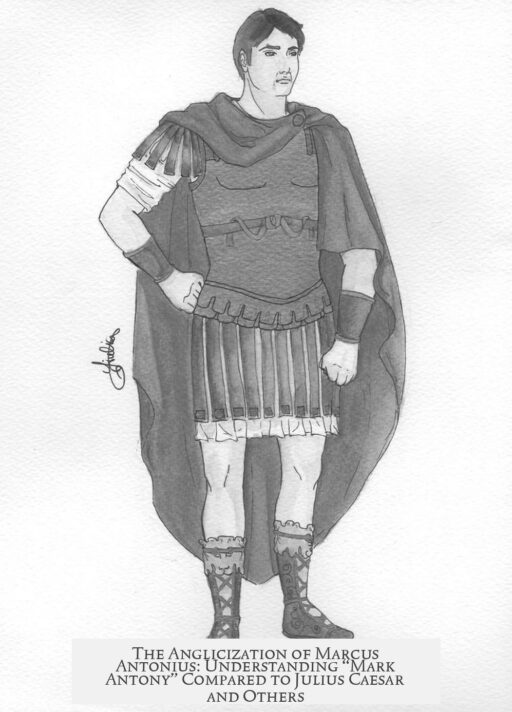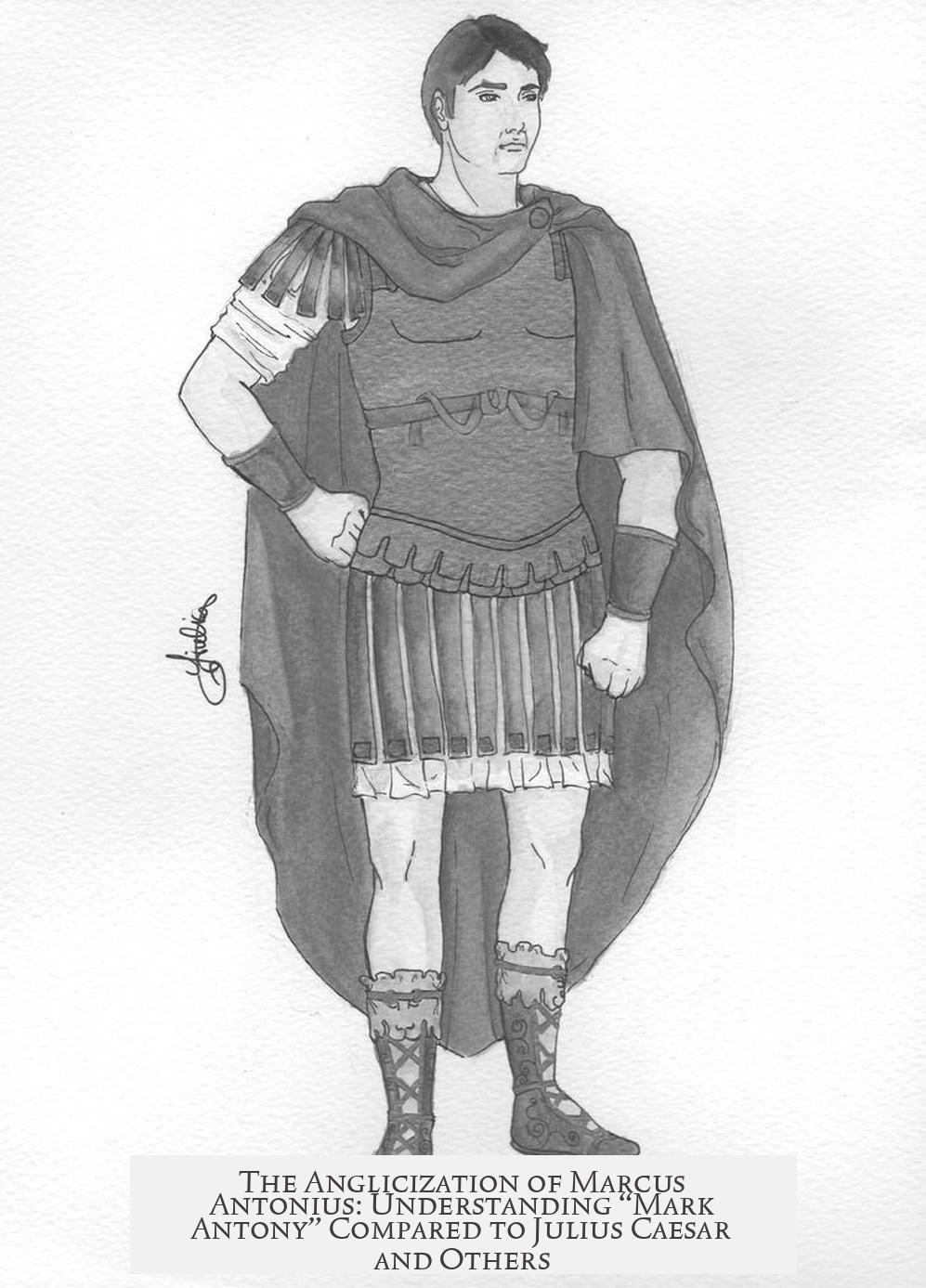Marcus Antonius’ name is anglicized to “Mark Antony” primarily due to Shakespeare’s influence and earlier English literary traditions. While other contemporaries like Gaius Julius Caesar retain forms closer to Latin, Antony’s name was adapted to fit English poetic and cultural norms.

Shakespeare’s play Antony and Cleopatra firmly established “Mark Antony” as the standard English form. The choice of “Antony” over “Antonius” helped maintain the rhythm and melody of iambic pentameter, the meter Shakespeare used. “Antony” ends with a softer, more melodic sound suited for drama. In contrast, “Antonius” would disrupt the flow of Shakespeare’s verse.
Before Shakespeare, the anglicized form “Antony” was already in use. In 1594, Samuel Daniel’s work featured “Antony” instead of “Antonius.” Daniel adopted this from his patroness, the Countess of Pembroke, who translated the French theater piece by Robert Garnier. Garnier’s original French title used “Marc Antoine,” showing French tradition’s role in anglicizing the name.

French influence is significant. Marcus Antonius becomes “Marc Antoine” in French, and this form passed into English literary culture through translations and adaptations. This process led to “Mark Antony” becoming the commonly accepted form in English, reflecting both linguistic and cultural exchanges.
| Factor | Details |
|---|---|
| Shakespeare’s Impact | Popularized “Mark Antony” in Antony and Cleopatra, aiding the name’s lasting use |
| Poetic Rhythm | “Antony” fits iambic pentameter better than “Antonius” |
| Earlier English Usage | Samuel Daniel (1594) used “Antony” following literary tradition |
| French Influence | Derived from French “Marc Antoine,” shaping English forms |
Other Latin names like Gaius Julius Caesar remain less altered because their forms naturally suit English pronunciation and poetic uses. Caesar’s name also lacks earlier translation layers that affected “Antony.” Lepidus remains closer to original Latin due to limited literary adaptation driving name changes.

- Shakespeare’s play cemented “Mark Antony” in English culture.
- Poetic demands favored “Antony” over “Antonius.”
- Earlier literary translations reinforced this anglicized form.
- French translations influenced English naming conventions.
- Other politicians’ names lacked similar literary or cultural pressures.
Why is Marcus Antonius’ Name Anglicized to “Mark Antony” While Others Keep Their Original Form?
Have you ever wondered why Marcus Antonius is known as Mark Antony in English, but his fellow Roman politicians like Gaius Julius Caesar and Lepidus retain their original Latin names? It’s an intriguing question that combines literature, history, and language evolution in a fascinating way. Let’s dive in and unravel this linguistic mystery.

Simply put, Marcus Antonius becomes “Mark Antony” in English mainly because of Shakespeare’s influence, existing English naming conventions, rhythmic considerations of the English language, and even a bit of French linguistic heritage thrown into the mix. But there’s more beneath the surface.
A Dramatic Shift: Shakespeare’s Role in Popularizing “Mark Antony”

When you think about Roman history in English, the version you know has very likely been shaped by Shakespeare. His play Antony and Cleopatra set the scene, presenting Marcus Antonius consistently as “Antony.”
This naming wasn’t random. Shakespeare’s cultural clout in the English-speaking world is immense. Because of his plays, “Mark Antony” became the iconic name for the Triumvir—the political heavy hitter alongside Julius Caesar and Octavian. The play’s popularity embedded this anglicized name into the English literary and historical imagination like wax on a hot seal.

In fact, Shakespeare’s choice made “Antony” a standard reference. This was not the first time this anglicization surfaced, but his play cemented it firmly.
Rhythm and Flow: Iambic Pentameter’s Secret Influence

Let’s get poetic for a moment. Shakespeare often wrote in iambic pentameter—a rhythmic pattern that sounds like da-DUM da-DUM da-DUM da-DUM da-DUM. The name “Antonius” with its five syllables doesn’t fit this rhythm well.
Picture this: “Mark Antony” clicks perfectly in iambic pentameter. That familiar, punchy cadence flows smoothly on the tongue during performances or readings. Shakespeare knows that “Antonius” sounds clunky and disrupts his poetic meter. So, for artistic reasons, he favored “Antony” to keep the rhythm sweet and the audience enchanted.
Without this poetic necessity, the Latin “Antonius” would sound less natural in Elizabethan English drama.
Following an Existing English Tradition
Shakespeare wasn’t blazing a new trail here. The anglicization to “Antony” predates his Antony and Cleopatra. Back in 1594, Samuel Daniel, a contemporary of Shakespeare, wrote a Tragedy of Cleopatra where he used “Antony” instead of “Antonius.”
This shows that an English naming tradition for Marcus Antonius was already in place within literary circles. It was like the popular way to refer to him, especially in arts and letters, before Shakespeare officially made it canonical.
French Fascination: The Continental Connection
If we trace the story further back, the French influence becomes clear. The Countess of Pembroke, a notable patroness, translated from a French play by Robert Garnier titled Marc Antoine. This play translated the original Latin name into French as “Marc Antoine,” which sounds closer to Mark Antony than Antonius.
The French habit of adapting Roman names into their own phonetic and cultural framework likely filtered into English via translations and literary admiration.
Think of it as a linguistic relay race: Latin > French “Marc Antoine” > English “Mark Antony.” Shakespeare and Daniel inherited this tradition, and the name stuck.
Why Not Julius Caesar or Lepidus?
Now, you might ask: Why do names like Gaius Julius Caesar or Lepidus stay closer to their Latin originals? These figures’ names didn’t undergo anglicization for a few reasons.
First, “Caesar” is already well-known and pronounceable in English. It carries strong, recognizable weight that doesn’t require alteration. Plus, Caesar’s name has been referenced continuously across various media without a pressing need for change.
Lepidus, on the other hand, is less central in popular culture. His name remains mostly in historical texts and scholarly works, which usually preserve Latin forms for accuracy and respect for source material.
“Mark Antony” turns into a more approachable, familiar phrase, whereas Caesar and Lepidus don’t see a linguistic leap because it either feels unnecessary or their roles don’t demand poetic license in popular culture.
Practical Lessons from This Name Evolution
This story teaches us how names can morph based on culture, literature, and language needs. It highlights how the arts, especially theater and poetry, shape how history is remembered.
- Want to make a historical name easier for modern audiences? Consider phonetic simplicity and cultural exposure.
- Names tied to iconic literature can change permanently in a language’s lexicon.
- Poetic and rhythmic needs aren’t trivial—they can shape linguistic perception of historical figures.
Next time you say “Mark Antony,” you’re not just naming a Roman politician—you’re nodding to Shakespeare’s genius, French traditions, and the ebb of language over centuries.
In Conclusion: The Name Tells a Story Beyond History
So, why does Marcus Antonius become “Mark Antony” in English while his peers keep their names? Because Shakespeare’s poetic demands, an existing English naming tradition, and French influence all collaborated to create and solidify “Mark Antony” as the go-to name.
This naming story reveals how language is not static. It twists and turns through culture, art, and time. It also shows that names we take for granted carry hidden tales about the people who shaped how we see the past.
And what about you? Which other historical figures’ names do you find confusingly anglicized or surprisingly untouched? Imagine what stories their names might tell!




